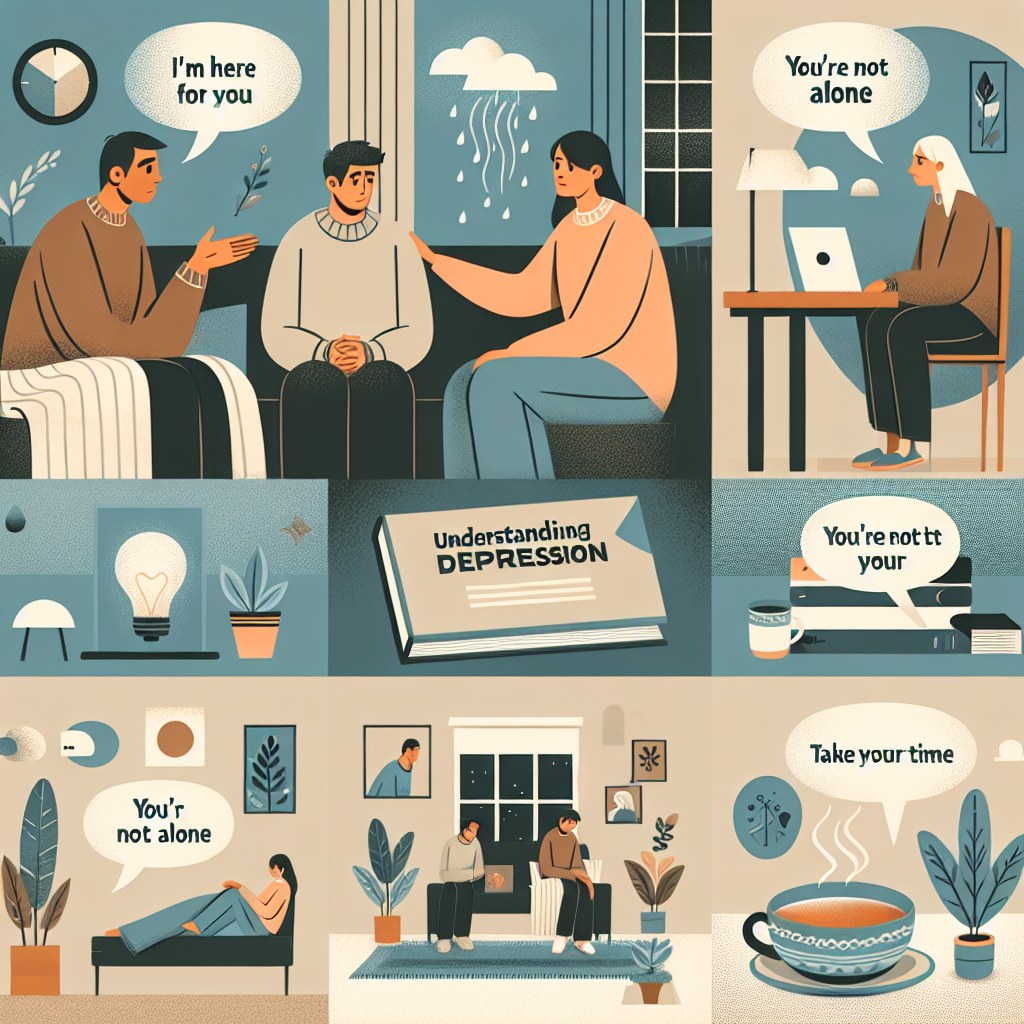Das hier ist dein Text, hier kannst du deine Verkaufsargumente platzieren oder andere wichtige Informationen mit deinen Interessenten teilen.
Make your appointment now
In today's fast-paced world, where work demands, social commitments, and technological distractions are ever-present, maintaining a healthy relationship can be challenging.
Depression is a complex and challenging mental health condition that affects millions of people worldwide. If you have a friend, family member, or partner who is struggling with depression, it can be difficult to know how to help them effectively. This guide will provide practical advice and strategies to support someone with depression, making it easier to navigate this difficult situation with empathy and understanding.
Depression is more than just feeling sad or having a bad day. It is a serious mental health disorder that can impact every aspect of a person's life. Understanding the symptoms of depression is crucial in providing the right support.
Some common symptoms of depression include:
Persistent sadness or low mood
Loss of interest or pleasure in activities
Changes in appetite or weight
Difficulty sleeping or oversleeping
Fatigue or loss of energy
Difficulty concentrating or making decisions
Feelings of worthlessness or excessive guilt
Thoughts of self-harm or suicide
If you notice these symptoms in someone you care about, it's important to take them seriously and offer your support.
One of the most challenging aspects of helping someone with depression is knowing what to say. Here are some tips for having supportive and empathetic conversations:
Sometimes, the best thing you can do is simply be there for them. Let them know that you are available to listen without judgment. Offer a safe space for them to express their feelings and concerns.
When talking to someone with depression, use language that is compassionate and non-judgmental. Avoid saying things like "cheer up" or "snap out of it," as these phrases can be dismissive. Instead, try saying:
"I'm here for you."
"I'm sorry you're going through this."
"It's okay to feel this way."
While it's important to be supportive, remember that you are not a mental health professional. Encourage your loved one to seek help from a therapist or counselor who can provide the appropriate treatment and support.

Supporting someone with depression goes beyond just talking. Here are some practical ways to help:
Recovery from depression takes time, and there will be ups and downs along the way. Be patient and understanding, and avoid putting pressure on them to "get better" quickly.
Depression can make even simple tasks feel overwhelming. Offer to help with daily activities, such as cooking, cleaning, or running errands. Your assistance can relieve some of the burden they may be feeling.
Gently encourage your loved one to engage in activities that promote mental well-being, such as exercise, healthy eating, and adequate sleep. However, be mindful not to push too hard, as this may cause additional stress.
Isolation can worsen depression symptoms, so make an effort to stay connected. Invite them to social events, go for walks together, or simply spend time with them at home. Even small gestures can make a big difference.
Living with a depressed person can be challenging, but there are ways to cope and support them effectively:
While it's important to be supportive, it's also crucial to set boundaries and take care of your own mental health. Communicate your needs and limits clearly to avoid burnout.
Learn more about depression and its treatment options. The more you understand the condition, the better equipped you'll be to support your loved one and manage your expectations.
Supporting someone with depression can be emotionally draining. Consider seeking support for yourself, whether through therapy, support groups, or talking with friends and family.
Supporting a loved one's recovery from depression involves encouragement and understanding:
Recovery from depression is a gradual process. Celebrate small victories and progress, no matter how minor they may seem. Positive reinforcement can boost motivation and self-esteem.
Remind your loved one to stay consistent with their treatment plan, whether it involves therapy, medication, or lifestyle changes. Consistency is key to managing symptoms and promoting recovery.
Create a supportive and positive environment at home. Encourage open communication and show appreciation for their efforts, even when progress is slow.
While there are many ways to support a depressed person, there are also actions to avoid:
Avoid dismissing their feelings or suggesting that they are overreacting. Depression is a real and serious condition, and their emotions are valid.
Depression can cause irritability and withdrawal, which may lead to misunderstandings. Try not to take their behavior personally and remember that it's the depression talking, not them.
Resist the urge to offer unsolicited advice or solutions. Instead, focus on listening and providing support. If they ask for advice, share your thoughts gently and respectfully.
Helping someone with depression can be challenging, but your support can make a significant difference in their recovery journey. By understanding depression, communicating effectively, and providing practical support, you can help your loved one navigate this difficult time. Remember to take care of yourself as well and seek support when needed. Together, you can work towards healing and hope.
Make your appointment now
We take only 5 couples with us
Reserve your spot now!
Over the years, the infatuation often gives way to living side by side as partners. In everyday life with children, a career and different leisure activities, you lose the connection.


Susana and Markus Kessler have been in a happy relationship for more than 25 years. To ensure that their partnership continues to grow, they have repeatedly attended coaching and training sessions on all aspects of their relationship, including communication, money management, and parenting.
A particularly meaningful chapter in their lives was raising two severely traumatized foster children. This journey required extraordinary patience, resilience, and dedication. Through love, understanding, and the knowledge they gained from their own personal development, they were able to provide a nurturing and supportive environment for their foster children to heal and grow. This life-changing experience further deepened their empathy and strengthened their ability to help others facing challenges in their relationships and lives.
They have built up several businesses and have become financially free as a result. They have also attended countless coaching and training sessions for their business on sales, marketing, social media, business development, and investing.
They have been trained coaches since 2015 and are passionate about passing on their knowledge. Their coaching approach is practical, solution-oriented, and individually tailored to the needs of their clients. They offer comprehensive support in the areas of personal development, relationship building and maintenance, financial education, and entrepreneurial growth.
Susana and Markus offer various coaching formats to ensure maximum flexibility for their clients. These include:
With their many years of experience, in-depth knowledge, and the invaluable lessons learned from raising foster children, Susana and Markus Kessler help people to strengthen their relationships and make the most of their lives and opportunities.

Our knowledge comes from 25 years of relationship experience as well as training and further education with the world's best in their field, including the NLP Academy Switzerland, J.T. Foxx, T. Harv Eker, Landmark Wordwide, John Kehoe, Maja Storch and many more.

Every partnership is different. We recognize your individual personalities and work with your own resources to support you perfectly on your path to the perfect partnership.

Anyone who talks about their relationship deserves absolute discretion and an atmosphere of trust. That's why we offer you an empathic environment in which you feel safe and secure and can speak openly with each other.